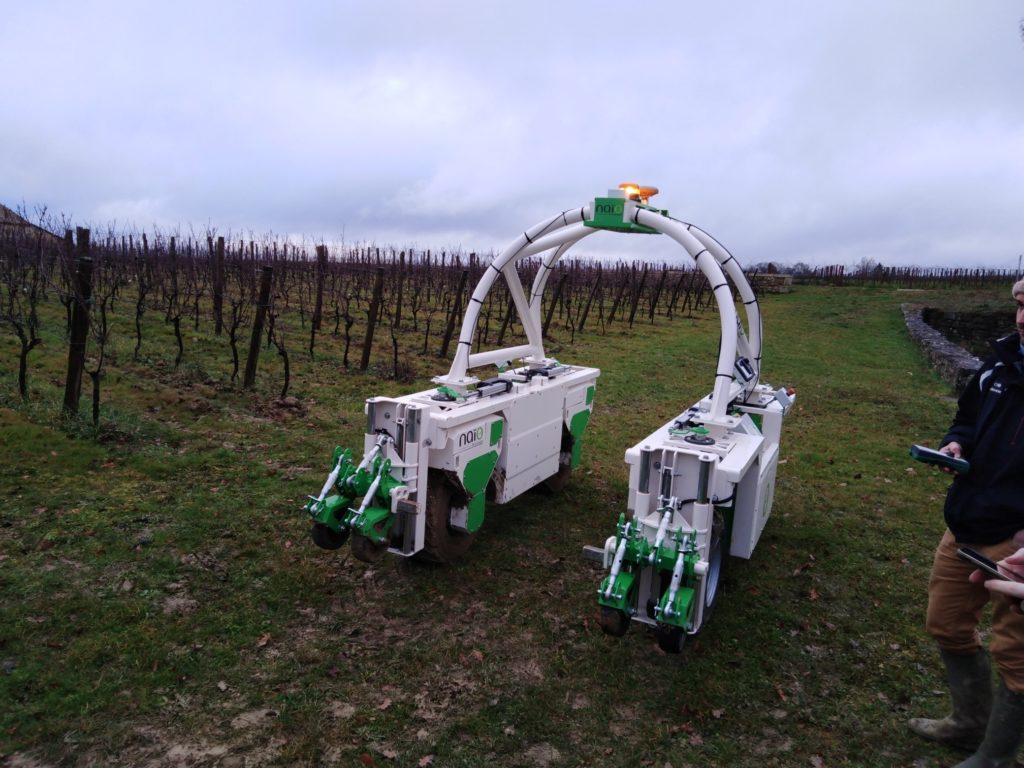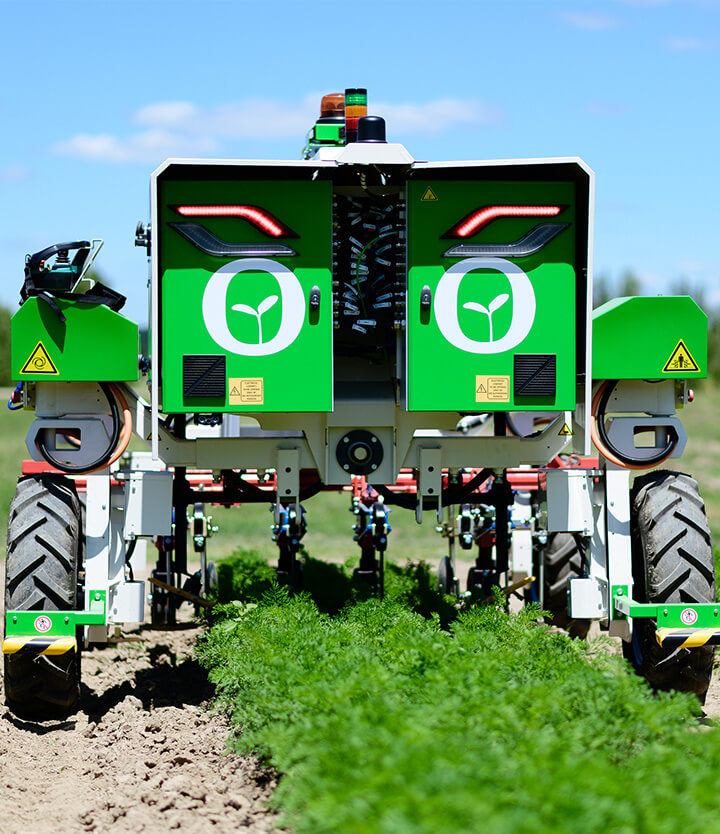#Ted in the West – Part 2
Very active in the southwest of France, Ted, the weeding robot, is involved in two major research and development projects in partnership with wine cooperatives in Gironde and Dordogne. The aim is to give producers the opportunity to test an alternative to existing weeding methods, under real operating conditions on their own vineyards, before promulgating these new practices among their members. And all the while, Ted is growing, improving and becoming more complete thanks to the practical feedback from the field. This month, discover the project undertaken with the Monbazillac cooperative winery and many institutional and professional partners.
Developing agri-environmental practices
The vineyards of Chateau Monbazillac are regularly used as a full-scale testing ground.
“From mating disruption tests to control certain insects, to the BatViti project to assess the predation of bats on pests, we always focus on innovations that can feed into viticulture development. The Monbazillac cooperative winery, which directly manages the Chateau estate, makes it possible to scale up these projects: once the effectiveness of these methods has been validated, we can pass them on to our members and allow them to benefit from our experience” states Guillaume Barou, Vice-President of the cooperative, which comprises some fifty winegrowers of the appellation and 900 hectares of vineyards.
The latest R&D project consists of testing mechanical weeding using the autonomous robot, Ted. This project is part of the VitiRev initiative in the Nouvelle-Aquitaine region to innovate in the wine sector, with the aim of developing agri-environmental practices within Territorial Innovation Laboratories. Cécile Lelabousse, Environment Project Manager at IVBD* and Leader of VitiRev in Bergerac, explains “We support producers looking to set up collective projects, so they become players in the transition. Both study material and real experiment, the idea is to determine whether this technology can become a practical tool for reducing chemical inputs in vineyards”.
A response tailored to the various business needs
That is how, since the end of April 2019, Ted has earned a place among the botrytised grapes. Tested on 7 hectares, each of its outings results in surveys, calculations and tests based on a protocol established with Naio, so as to gauge the weeding efficiency, ergonomics, how the robot adapts to the field, its mechanical and software use and its tools and equipment, etc. Next, Ted will be deployed on 12 additional hectares at Château Le Barradis, an organic vineyard of the PDO, to tackle its limitations during endurance tests.

According to Thibaut Delcroix, Vineyard Manager at Naio, “the point of sending the robot into the field is to get the most relevant feedback possible from professionals in the sector. Through such partnerships, we undertake to cover the territory and increase the number of tests within close, yet diversified, pedoclimatic and geographical contexts. Our intention is to be able in due course to provide as many winegrowers as possible with solutions tailored to their actual needs”.
Inter-professional, viticultural, agricultural, departmental and educational partnership
And the story does not end there: spurred on by the Monbazillac cooperative and the IVBD, several partners have joined the project. As Cécile Lelabousse explains “The Chamber of Agriculture, which already brings its technical knowledge, will also disseminate the results of the tests to its contacts. During the second year of the project, the agricultural equipment company Somaref will be working on an electric rotary brush prototype” to further equip Ted in addition to the mechanical weeding solution, explains Cécile Lelabousse. Moreover, during the 2019-2020 academic year, students from the “Lycée des Métiers Hélène Duc de Bergerac” vocational school will be working to design a mechanical tool to break up tracks and rotary tools for Ted.
“Viticulture needs to be reinvented and we are convinced that it is important to play a key role in the development of new solutions, to co-create tools that meet our expectations” says Guillaume Barou. “Our goal is to prove that robotics can be an effective and profitable solution for plant health. And at the end of these tests, we will be able to say that it has been effective if all the obstacles have been removed and we’re happy with the finalized tool.” Apart from the members of the Monbazillac cooperative winery, the project may offer opportunities for other vineyards, since results will be made public. What’s more, the multidisciplinary dimension of this project makes it possible to bring together the various players in a territory, in a dynamic that is for viticulture as a whole and ‘virtuous’ from an environmental perspective.
* IVBD, ‘Interprofession des Vins de Bergerac et Duras’ – Inter-profession of Bergerac and Duras wines.
For more info about the TED robot follow the link!
Find Part 1 of this mini-series #Ted in the West, about the project carried out with the Univitis wine
cooperative.





